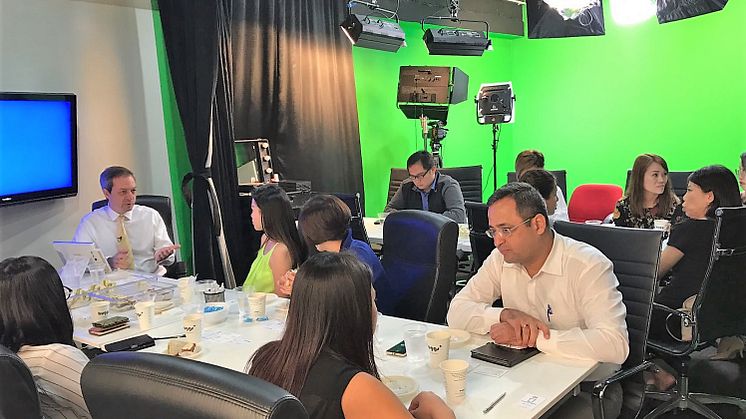
News -
How to solve the post-event marketing headache
The sheer number of sign-ups from both corporates and the event management industry to the latest APACD Coaching Day shows the headaches many Communications Directors experience when it comes to post-event marketing.
Senior Communications Directors from APACD (the Asia Pacific Association for Communications Directors) discussed 4+8 street smart techniques in post-event marketing, when they came together at the Hong Bao Media (HBM) Integrated Communications Centre for the 3-hour workshop today.
Key issues they raised:
- Unclear goals or difficult-to-quantify targeted outcomes
- Lack of discipline in capturing new leads garnered at the event into their CRM
- Lack of ownership of post-event marketing initiatives
- Lack of follow-up with leads
- Difficulty in going beyond the usual "thank you" emails
- Difficulty in getting approval for post-event marketing mail-outs in a timely manner
- What comes first – the budget or the target?
- Lack of budget or resources to produce post-event marketing content
- Difficulty in being honest in post-event reports for fear of offending important stakeholders/compulsion to make the post-event report rosy
- Falling short of potential for maximising the investment in the event
- Lack of follow-up on post-event report
- Difficulty in securing media coverage of the event
- Difficulty in getting the media to mention the event by name
To address these challenges, our facilitator Mark Laudi took Communications Directors through some difficult but fundamental questions about the role of events in their business, before they commit to specific post-event marketing tactics.
- Who owns the post-event follow-up? In many organisations, there is no clear process which determines where marketing ends and sales begins. Many marketers are resigned that there is only so much they can do before the sales team has to play their part. However, if the event is entirely sales driven, the marketing team is reduced to playing the role of 'event coordinator'. Where the boundary is will vary among organisations, but identifying it is mission-critical to achieving your outcomes from any post-event marketing initiative.
- How will you measure the success of your event? Even if your event aims to position your organisation as a thought-leader, there must be quantifiable outcomes (as per the mantra, "if it can't be measured, it doesn't exist"). During our conversation it became apparent that the empirical number of attendees was a poor measure because not everyone who attends has any intention of becoming a customer. There was also some discussion whether Facebook Likes or Twitter followers constitute a viable measurement tool. But if there is no definitive revenue outcome, sooner or later the budget being spent on the event will be drawn into question.
- Is a post-event debrief undertaken, and acted upon? Frequently, these informal conversations are not codified in the post-event report, let alone acted upon to improve next year's event. Given that events must usually generate leads, the sales team should be drawn in to provide their input.
- How honest is the post-event report? These are usually rosy documents that accentuate the positives, to avoid conflict with team members who could have done better, or with the boss. However, this means the post-event debrief won't translate into improvements next year. For this reason, write two reports: one which you use to plan the next event, the other that helps you keep the peace, and your job! One participant even volunteered he writes three (!) post-event reports for different stakeholders.
These four questions are fundamental to making any improvements in post-event marketing. Even the best post-event marketing tactics can do little if you haven't answered these four questions first.
Next, post-event marketing must be planned long before the event. For example, if you wish to include photos or videos of the event, clearly those must be arranged long before the event date. Here are eight action items that leverage the content and networking elements of events:
- Collecting leads – assign one (1) person in marketing to handle CRM data entry. Make it their job to collect all the names or business cards of leads from all your staff at the event, and to key that data into SAP, Salesforce, or whatever CRM you are using. Some participants described the problem with their outdated CRM database that contained many duplicates, and that no one took care of. No amount of award-winning post-event marketing will solve this problem. This has to be fixed before the event. Entering more names just compounds the problem.
- Following up on leads – assign one (1) person in sales to ensure leads are distributed and acted upon. Often marketers are exasperated by the lack of follow-up to qualified leads. Someone on the sales side needs to own this job.
- Create a plan for post-event continuous engagement – The event should be a moment in time in the customer journey, to the extent that there is actually no such thing as pre- or post-event communications, just continuous engagement. Participants were unanimous that this engagement was required, but many also bemoaned the lack of time and resources. Clearly, resources are limited. But without a plan, nothing will ever happen.
- Break news – if you want to have something interesting to say in your post-event marketing, you have to have something interesting to say at your event. It has to be urgent and newsy. That's also the secret to attracting media interest in your event. This could be a product or service launch, the appointment of a new member of staff, or the presence of a crack-hot external speaker.
- Stage talks – whether you have a speaking slot during the conference or not, stage a talk. Use some of the space at your exhibition space for seating to allow interested passers-by to take a seat.
- Don't just invite the media, involve them! – we spent considerable time discussing how to attract media to cover an event. In addition, when reporters did attend, they then didn't mention the name of the event in their reports. But since many media companies are suffering a big decline in advertising and subscription sales, events are one way for them to shore up their revenues. Partnering a media organisation might lead to rival media declining to cover your event, but for some Communications Directors that may be better than not getting any coverage at all.
- Record a video interview – involve prospects who are not in the conference hall with you, while generating buzz at your exhibition space and creating content for post-event mail-out. If the media aren't coming to cover your event, cover it yourself as though you were your own media organisation. This gave Mark the opportunity to showcase a selection of programs HBM has produced for event organisers. For example, different video formats can help generate content which can be distributed through third-party websites in the days and weeks after the event. We discussed the importance of timely release of the content, and the lack of value offered by so-called "happy faces" videos.
- Conduct a live webcast from your event – this has the added benefit of immediacy, while eliminating the time-consuming approval process many Communications Directors have to go through before the post-event marketing content can be published. Any stakeholders whose approval is required should be involved early on in the process – not when the content has already been completed.
In summary, there is no silver bullet to getting post-event marketing right. Consequently, there are few examples of outstanding post-event marketing initiatives that checks all the above boxes (add a comment below if you think you have one!). But even the most brilliant marketing tactics will come to naught if goals and processes are not put in place first.
